Building a Sustainable Organization: Climeworks Strategic Analysis
VerifiedAdded on 2023/06/05
|12
|3361
|128
Report
AI Summary
This report provides an analysis of Climeworks, a company specializing in carbon dioxide capture technology, focusing on its approach to building a sustainable organization. It evaluates the roles and responsibilities of Christoph Gebald and Jan Wurzabacher as sustainable strategic managers, highlighting their strategic development, issue analysis, and risk management roles. The report also discusses the concepts and tools of strategic business management applicable to sustainability, such as BREEAM and SPeAR, and explores the economic and ethical dilemmas that strategic leaders face in balancing long and short-term goals, including economic slowdowns, inflation, honesty, fairness, and privacy. The document, contributed by a student, aims to provide insights into how organizations can integrate sustainability into their strategic management practices, with further resources available on Desklib.
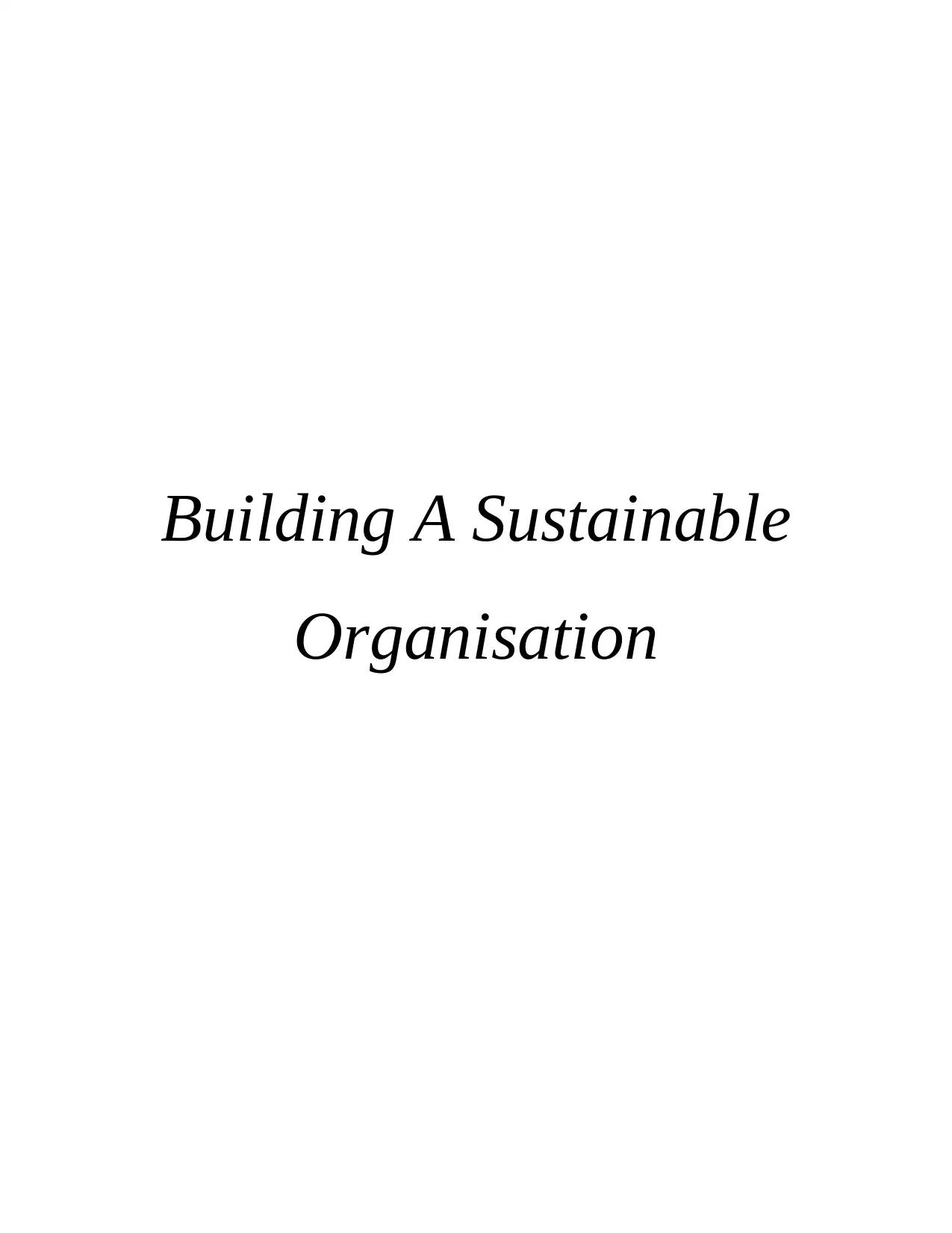
Building A Sustainable
Organisation
Organisation
Paraphrase This Document
Need a fresh take? Get an instant paraphrase of this document with our AI Paraphraser
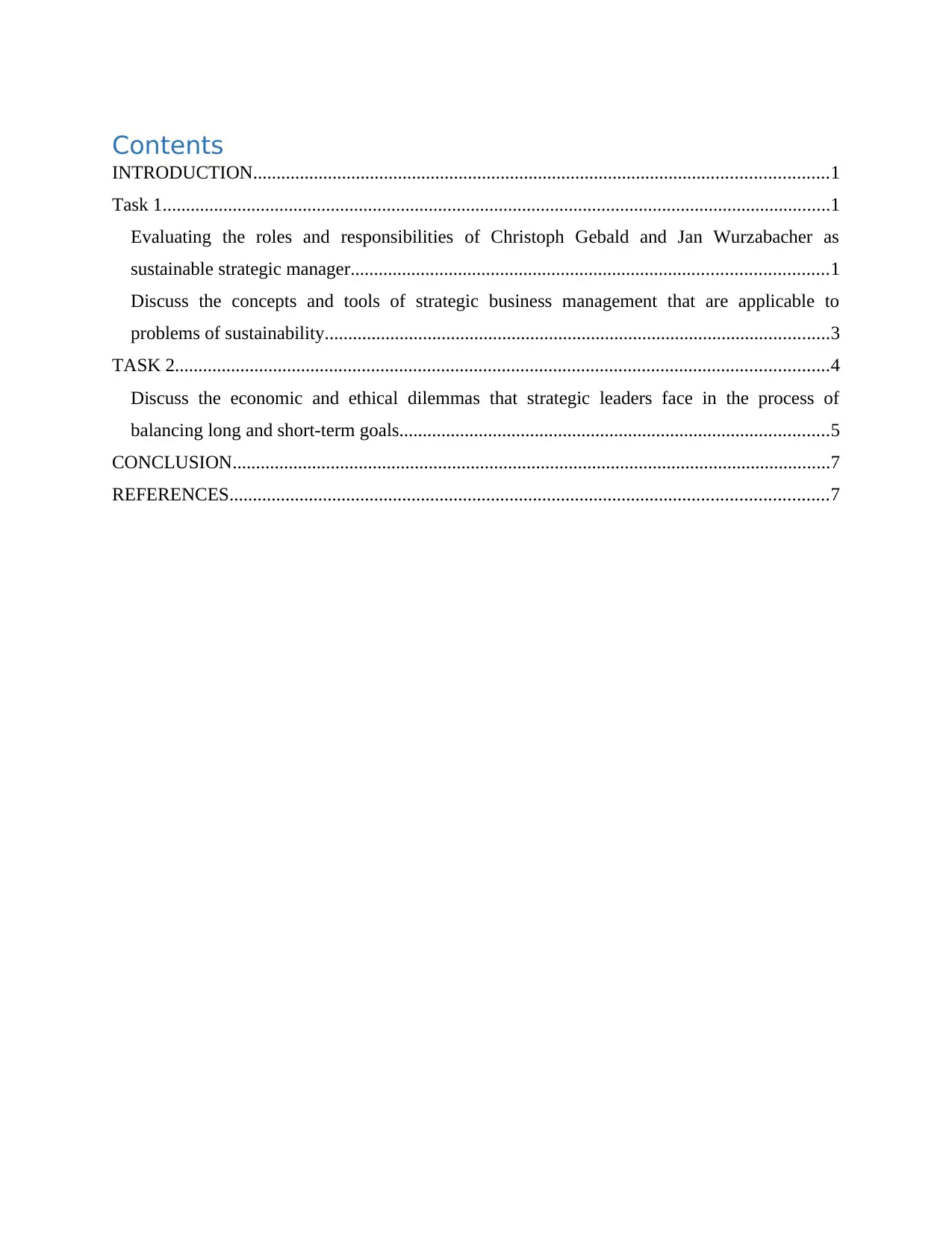
Contents
INTRODUCTION...........................................................................................................................1
Task 1...............................................................................................................................................1
Evaluating the roles and responsibilities of Christoph Gebald and Jan Wurzabacher as
sustainable strategic manager......................................................................................................1
Discuss the concepts and tools of strategic business management that are applicable to
problems of sustainability............................................................................................................3
TASK 2............................................................................................................................................4
Discuss the economic and ethical dilemmas that strategic leaders face in the process of
balancing long and short-term goals............................................................................................5
CONCLUSION................................................................................................................................7
REFERENCES................................................................................................................................7
INTRODUCTION...........................................................................................................................1
Task 1...............................................................................................................................................1
Evaluating the roles and responsibilities of Christoph Gebald and Jan Wurzabacher as
sustainable strategic manager......................................................................................................1
Discuss the concepts and tools of strategic business management that are applicable to
problems of sustainability............................................................................................................3
TASK 2............................................................................................................................................4
Discuss the economic and ethical dilemmas that strategic leaders face in the process of
balancing long and short-term goals............................................................................................5
CONCLUSION................................................................................................................................7
REFERENCES................................................................................................................................7

⊘ This is a preview!⊘
Do you want full access?
Subscribe today to unlock all pages.

Trusted by 1+ million students worldwide
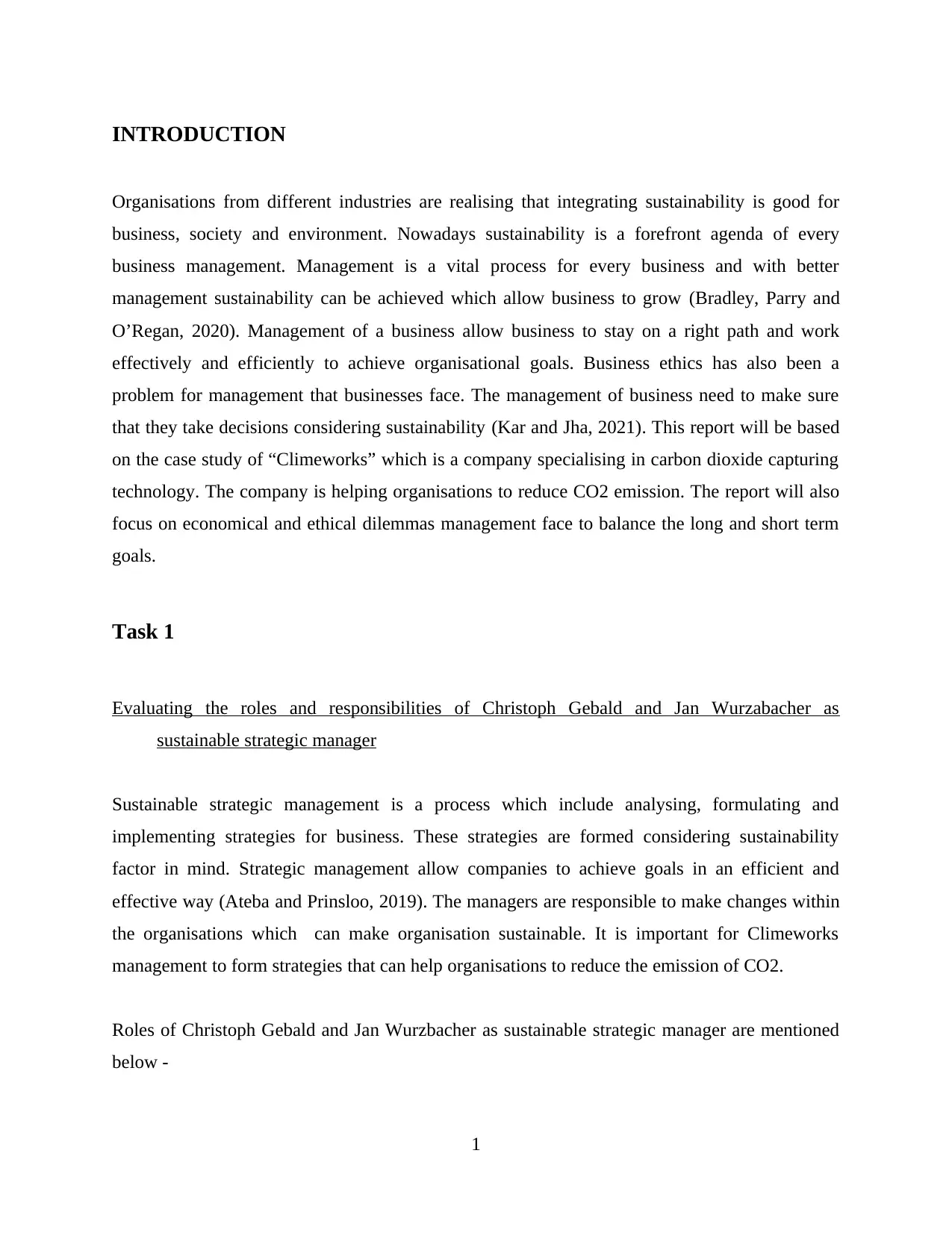
INTRODUCTION
Organisations from different industries are realising that integrating sustainability is good for
business, society and environment. Nowadays sustainability is a forefront agenda of every
business management. Management is a vital process for every business and with better
management sustainability can be achieved which allow business to grow (Bradley, Parry and
O’Regan, 2020). Management of a business allow business to stay on a right path and work
effectively and efficiently to achieve organisational goals. Business ethics has also been a
problem for management that businesses face. The management of business need to make sure
that they take decisions considering sustainability (Kar and Jha, 2021). This report will be based
on the case study of “Climeworks” which is a company specialising in carbon dioxide capturing
technology. The company is helping organisations to reduce CO2 emission. The report will also
focus on economical and ethical dilemmas management face to balance the long and short term
goals.
Task 1
Evaluating the roles and responsibilities of Christoph Gebald and Jan Wurzabacher as
sustainable strategic manager
Sustainable strategic management is a process which include analysing, formulating and
implementing strategies for business. These strategies are formed considering sustainability
factor in mind. Strategic management allow companies to achieve goals in an efficient and
effective way (Ateba and Prinsloo, 2019). The managers are responsible to make changes within
the organisations which can make organisation sustainable. It is important for Climeworks
management to form strategies that can help organisations to reduce the emission of CO2.
Roles of Christoph Gebald and Jan Wurzbacher as sustainable strategic manager are mentioned
below -
1
Organisations from different industries are realising that integrating sustainability is good for
business, society and environment. Nowadays sustainability is a forefront agenda of every
business management. Management is a vital process for every business and with better
management sustainability can be achieved which allow business to grow (Bradley, Parry and
O’Regan, 2020). Management of a business allow business to stay on a right path and work
effectively and efficiently to achieve organisational goals. Business ethics has also been a
problem for management that businesses face. The management of business need to make sure
that they take decisions considering sustainability (Kar and Jha, 2021). This report will be based
on the case study of “Climeworks” which is a company specialising in carbon dioxide capturing
technology. The company is helping organisations to reduce CO2 emission. The report will also
focus on economical and ethical dilemmas management face to balance the long and short term
goals.
Task 1
Evaluating the roles and responsibilities of Christoph Gebald and Jan Wurzabacher as
sustainable strategic manager
Sustainable strategic management is a process which include analysing, formulating and
implementing strategies for business. These strategies are formed considering sustainability
factor in mind. Strategic management allow companies to achieve goals in an efficient and
effective way (Ateba and Prinsloo, 2019). The managers are responsible to make changes within
the organisations which can make organisation sustainable. It is important for Climeworks
management to form strategies that can help organisations to reduce the emission of CO2.
Roles of Christoph Gebald and Jan Wurzbacher as sustainable strategic manager are mentioned
below -
1
Paraphrase This Document
Need a fresh take? Get an instant paraphrase of this document with our AI Paraphraser
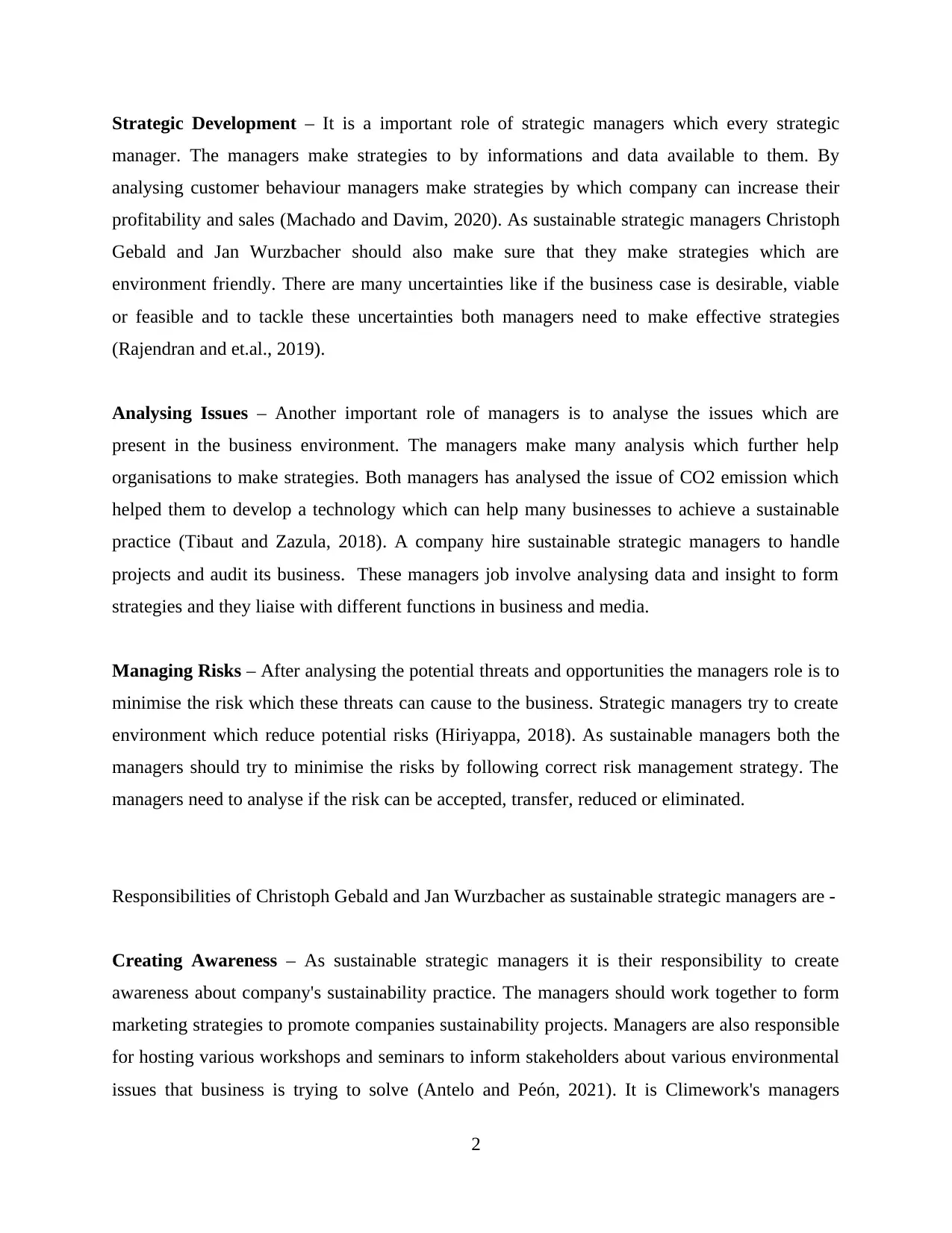
Strategic Development – It is a important role of strategic managers which every strategic
manager. The managers make strategies to by informations and data available to them. By
analysing customer behaviour managers make strategies by which company can increase their
profitability and sales (Machado and Davim, 2020). As sustainable strategic managers Christoph
Gebald and Jan Wurzbacher should also make sure that they make strategies which are
environment friendly. There are many uncertainties like if the business case is desirable, viable
or feasible and to tackle these uncertainties both managers need to make effective strategies
(Rajendran and et.al., 2019).
Analysing Issues – Another important role of managers is to analyse the issues which are
present in the business environment. The managers make many analysis which further help
organisations to make strategies. Both managers has analysed the issue of CO2 emission which
helped them to develop a technology which can help many businesses to achieve a sustainable
practice (Tibaut and Zazula, 2018). A company hire sustainable strategic managers to handle
projects and audit its business. These managers job involve analysing data and insight to form
strategies and they liaise with different functions in business and media.
Managing Risks – After analysing the potential threats and opportunities the managers role is to
minimise the risk which these threats can cause to the business. Strategic managers try to create
environment which reduce potential risks (Hiriyappa, 2018). As sustainable managers both the
managers should try to minimise the risks by following correct risk management strategy. The
managers need to analyse if the risk can be accepted, transfer, reduced or eliminated.
Responsibilities of Christoph Gebald and Jan Wurzbacher as sustainable strategic managers are -
Creating Awareness – As sustainable strategic managers it is their responsibility to create
awareness about company's sustainability practice. The managers should work together to form
marketing strategies to promote companies sustainability projects. Managers are also responsible
for hosting various workshops and seminars to inform stakeholders about various environmental
issues that business is trying to solve (Antelo and Peón, 2021). It is Climework's managers
2
manager. The managers make strategies to by informations and data available to them. By
analysing customer behaviour managers make strategies by which company can increase their
profitability and sales (Machado and Davim, 2020). As sustainable strategic managers Christoph
Gebald and Jan Wurzbacher should also make sure that they make strategies which are
environment friendly. There are many uncertainties like if the business case is desirable, viable
or feasible and to tackle these uncertainties both managers need to make effective strategies
(Rajendran and et.al., 2019).
Analysing Issues – Another important role of managers is to analyse the issues which are
present in the business environment. The managers make many analysis which further help
organisations to make strategies. Both managers has analysed the issue of CO2 emission which
helped them to develop a technology which can help many businesses to achieve a sustainable
practice (Tibaut and Zazula, 2018). A company hire sustainable strategic managers to handle
projects and audit its business. These managers job involve analysing data and insight to form
strategies and they liaise with different functions in business and media.
Managing Risks – After analysing the potential threats and opportunities the managers role is to
minimise the risk which these threats can cause to the business. Strategic managers try to create
environment which reduce potential risks (Hiriyappa, 2018). As sustainable managers both the
managers should try to minimise the risks by following correct risk management strategy. The
managers need to analyse if the risk can be accepted, transfer, reduced or eliminated.
Responsibilities of Christoph Gebald and Jan Wurzbacher as sustainable strategic managers are -
Creating Awareness – As sustainable strategic managers it is their responsibility to create
awareness about company's sustainability practice. The managers should work together to form
marketing strategies to promote companies sustainability projects. Managers are also responsible
for hosting various workshops and seminars to inform stakeholders about various environmental
issues that business is trying to solve (Antelo and Peón, 2021). It is Climework's managers
2
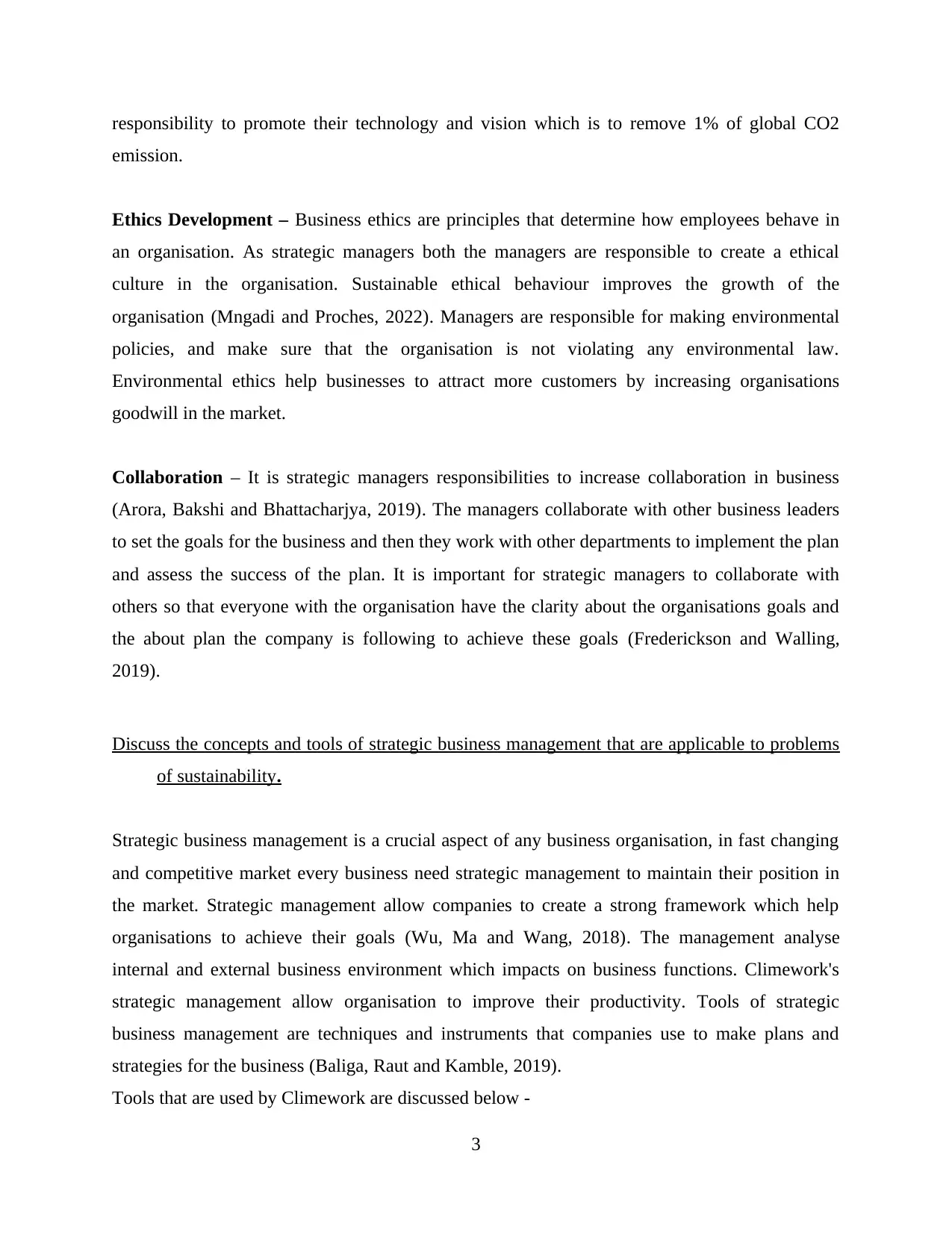
responsibility to promote their technology and vision which is to remove 1% of global CO2
emission.
Ethics Development – Business ethics are principles that determine how employees behave in
an organisation. As strategic managers both the managers are responsible to create a ethical
culture in the organisation. Sustainable ethical behaviour improves the growth of the
organisation (Mngadi and Proches, 2022). Managers are responsible for making environmental
policies, and make sure that the organisation is not violating any environmental law.
Environmental ethics help businesses to attract more customers by increasing organisations
goodwill in the market.
Collaboration – It is strategic managers responsibilities to increase collaboration in business
(Arora, Bakshi and Bhattacharjya, 2019). The managers collaborate with other business leaders
to set the goals for the business and then they work with other departments to implement the plan
and assess the success of the plan. It is important for strategic managers to collaborate with
others so that everyone with the organisation have the clarity about the organisations goals and
the about plan the company is following to achieve these goals (Frederickson and Walling,
2019).
Discuss the concepts and tools of strategic business management that are applicable to problems
of sustainability.
Strategic business management is a crucial aspect of any business organisation, in fast changing
and competitive market every business need strategic management to maintain their position in
the market. Strategic management allow companies to create a strong framework which help
organisations to achieve their goals (Wu, Ma and Wang, 2018). The management analyse
internal and external business environment which impacts on business functions. Climework's
strategic management allow organisation to improve their productivity. Tools of strategic
business management are techniques and instruments that companies use to make plans and
strategies for the business (Baliga, Raut and Kamble, 2019).
Tools that are used by Climework are discussed below -
3
emission.
Ethics Development – Business ethics are principles that determine how employees behave in
an organisation. As strategic managers both the managers are responsible to create a ethical
culture in the organisation. Sustainable ethical behaviour improves the growth of the
organisation (Mngadi and Proches, 2022). Managers are responsible for making environmental
policies, and make sure that the organisation is not violating any environmental law.
Environmental ethics help businesses to attract more customers by increasing organisations
goodwill in the market.
Collaboration – It is strategic managers responsibilities to increase collaboration in business
(Arora, Bakshi and Bhattacharjya, 2019). The managers collaborate with other business leaders
to set the goals for the business and then they work with other departments to implement the plan
and assess the success of the plan. It is important for strategic managers to collaborate with
others so that everyone with the organisation have the clarity about the organisations goals and
the about plan the company is following to achieve these goals (Frederickson and Walling,
2019).
Discuss the concepts and tools of strategic business management that are applicable to problems
of sustainability.
Strategic business management is a crucial aspect of any business organisation, in fast changing
and competitive market every business need strategic management to maintain their position in
the market. Strategic management allow companies to create a strong framework which help
organisations to achieve their goals (Wu, Ma and Wang, 2018). The management analyse
internal and external business environment which impacts on business functions. Climework's
strategic management allow organisation to improve their productivity. Tools of strategic
business management are techniques and instruments that companies use to make plans and
strategies for the business (Baliga, Raut and Kamble, 2019).
Tools that are used by Climework are discussed below -
3
⊘ This is a preview!⊘
Do you want full access?
Subscribe today to unlock all pages.

Trusted by 1+ million students worldwide
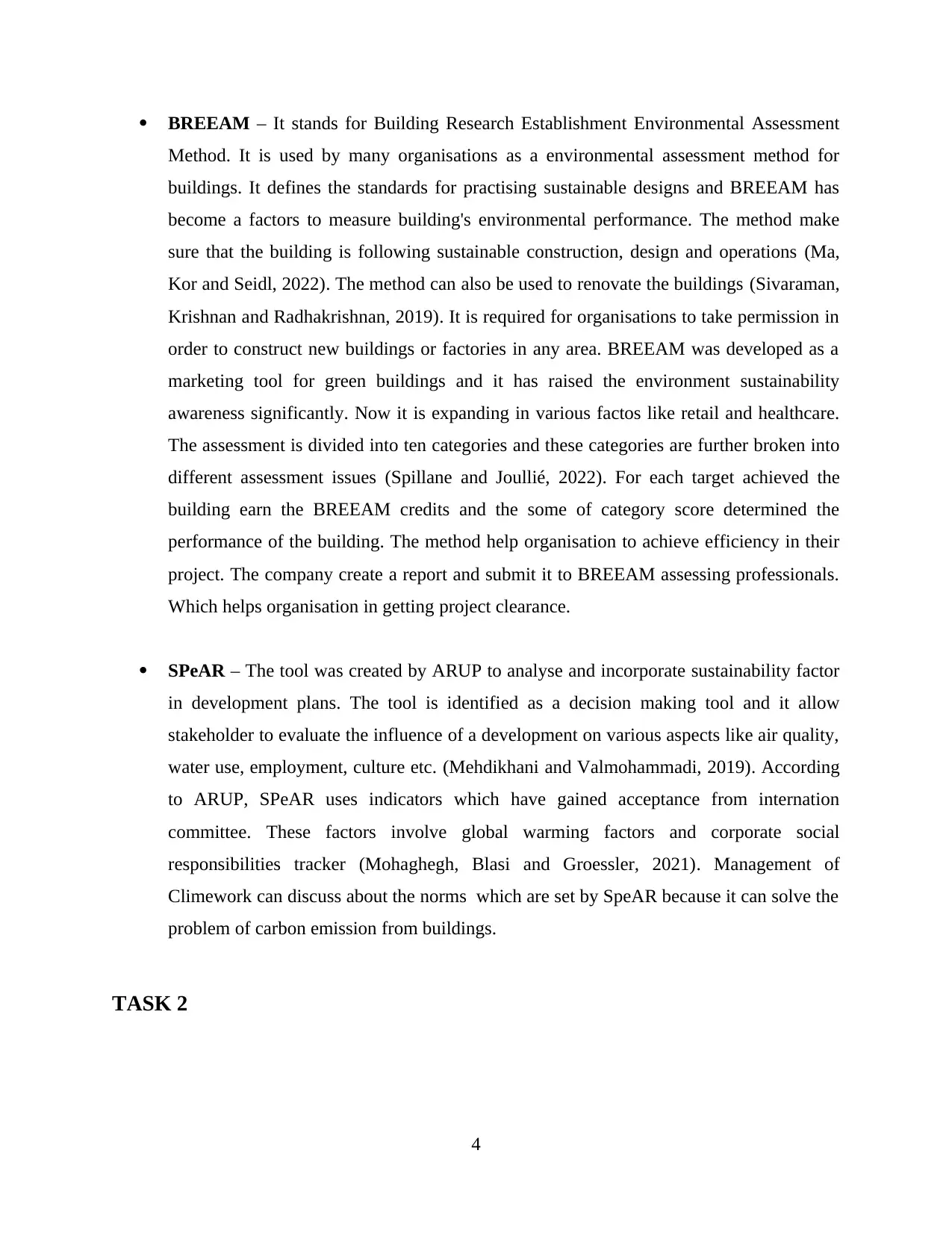
BREEAM – It stands for Building Research Establishment Environmental Assessment
Method. It is used by many organisations as a environmental assessment method for
buildings. It defines the standards for practising sustainable designs and BREEAM has
become a factors to measure building's environmental performance. The method make
sure that the building is following sustainable construction, design and operations (Ma,
Kor and Seidl, 2022). The method can also be used to renovate the buildings (Sivaraman,
Krishnan and Radhakrishnan, 2019). It is required for organisations to take permission in
order to construct new buildings or factories in any area. BREEAM was developed as a
marketing tool for green buildings and it has raised the environment sustainability
awareness significantly. Now it is expanding in various factos like retail and healthcare.
The assessment is divided into ten categories and these categories are further broken into
different assessment issues (Spillane and Joullié, 2022). For each target achieved the
building earn the BREEAM credits and the some of category score determined the
performance of the building. The method help organisation to achieve efficiency in their
project. The company create a report and submit it to BREEAM assessing professionals.
Which helps organisation in getting project clearance.
SPeAR – The tool was created by ARUP to analyse and incorporate sustainability factor
in development plans. The tool is identified as a decision making tool and it allow
stakeholder to evaluate the influence of a development on various aspects like air quality,
water use, employment, culture etc. (Mehdikhani and Valmohammadi, 2019). According
to ARUP, SPeAR uses indicators which have gained acceptance from internation
committee. These factors involve global warming factors and corporate social
responsibilities tracker (Mohaghegh, Blasi and Groessler, 2021). Management of
Climework can discuss about the norms which are set by SpeAR because it can solve the
problem of carbon emission from buildings.
TASK 2
4
Method. It is used by many organisations as a environmental assessment method for
buildings. It defines the standards for practising sustainable designs and BREEAM has
become a factors to measure building's environmental performance. The method make
sure that the building is following sustainable construction, design and operations (Ma,
Kor and Seidl, 2022). The method can also be used to renovate the buildings (Sivaraman,
Krishnan and Radhakrishnan, 2019). It is required for organisations to take permission in
order to construct new buildings or factories in any area. BREEAM was developed as a
marketing tool for green buildings and it has raised the environment sustainability
awareness significantly. Now it is expanding in various factos like retail and healthcare.
The assessment is divided into ten categories and these categories are further broken into
different assessment issues (Spillane and Joullié, 2022). For each target achieved the
building earn the BREEAM credits and the some of category score determined the
performance of the building. The method help organisation to achieve efficiency in their
project. The company create a report and submit it to BREEAM assessing professionals.
Which helps organisation in getting project clearance.
SPeAR – The tool was created by ARUP to analyse and incorporate sustainability factor
in development plans. The tool is identified as a decision making tool and it allow
stakeholder to evaluate the influence of a development on various aspects like air quality,
water use, employment, culture etc. (Mehdikhani and Valmohammadi, 2019). According
to ARUP, SPeAR uses indicators which have gained acceptance from internation
committee. These factors involve global warming factors and corporate social
responsibilities tracker (Mohaghegh, Blasi and Groessler, 2021). Management of
Climework can discuss about the norms which are set by SpeAR because it can solve the
problem of carbon emission from buildings.
TASK 2
4
Paraphrase This Document
Need a fresh take? Get an instant paraphrase of this document with our AI Paraphraser
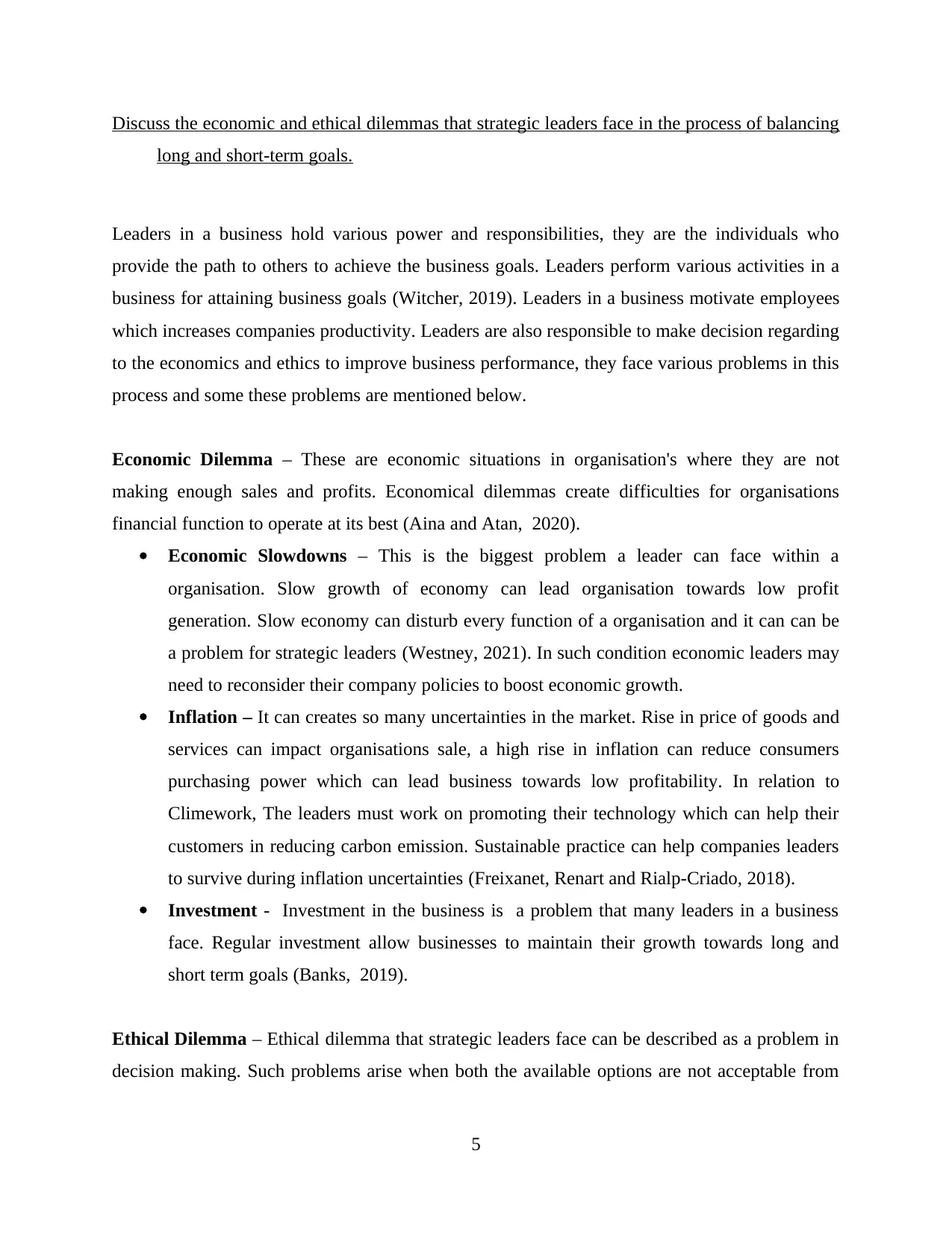
Discuss the economic and ethical dilemmas that strategic leaders face in the process of balancing
long and short-term goals.
Leaders in a business hold various power and responsibilities, they are the individuals who
provide the path to others to achieve the business goals. Leaders perform various activities in a
business for attaining business goals (Witcher, 2019). Leaders in a business motivate employees
which increases companies productivity. Leaders are also responsible to make decision regarding
to the economics and ethics to improve business performance, they face various problems in this
process and some these problems are mentioned below.
Economic Dilemma – These are economic situations in organisation's where they are not
making enough sales and profits. Economical dilemmas create difficulties for organisations
financial function to operate at its best (Aina and Atan, 2020).
Economic Slowdowns – This is the biggest problem a leader can face within a
organisation. Slow growth of economy can lead organisation towards low profit
generation. Slow economy can disturb every function of a organisation and it can can be
a problem for strategic leaders (Westney, 2021). In such condition economic leaders may
need to reconsider their company policies to boost economic growth.
Inflation – It can creates so many uncertainties in the market. Rise in price of goods and
services can impact organisations sale, a high rise in inflation can reduce consumers
purchasing power which can lead business towards low profitability. In relation to
Climework, The leaders must work on promoting their technology which can help their
customers in reducing carbon emission. Sustainable practice can help companies leaders
to survive during inflation uncertainties (Freixanet, Renart and Rialp-Criado, 2018).
Investment - Investment in the business is a problem that many leaders in a business
face. Regular investment allow businesses to maintain their growth towards long and
short term goals (Banks, 2019).
Ethical Dilemma – Ethical dilemma that strategic leaders face can be described as a problem in
decision making. Such problems arise when both the available options are not acceptable from
5
long and short-term goals.
Leaders in a business hold various power and responsibilities, they are the individuals who
provide the path to others to achieve the business goals. Leaders perform various activities in a
business for attaining business goals (Witcher, 2019). Leaders in a business motivate employees
which increases companies productivity. Leaders are also responsible to make decision regarding
to the economics and ethics to improve business performance, they face various problems in this
process and some these problems are mentioned below.
Economic Dilemma – These are economic situations in organisation's where they are not
making enough sales and profits. Economical dilemmas create difficulties for organisations
financial function to operate at its best (Aina and Atan, 2020).
Economic Slowdowns – This is the biggest problem a leader can face within a
organisation. Slow growth of economy can lead organisation towards low profit
generation. Slow economy can disturb every function of a organisation and it can can be
a problem for strategic leaders (Westney, 2021). In such condition economic leaders may
need to reconsider their company policies to boost economic growth.
Inflation – It can creates so many uncertainties in the market. Rise in price of goods and
services can impact organisations sale, a high rise in inflation can reduce consumers
purchasing power which can lead business towards low profitability. In relation to
Climework, The leaders must work on promoting their technology which can help their
customers in reducing carbon emission. Sustainable practice can help companies leaders
to survive during inflation uncertainties (Freixanet, Renart and Rialp-Criado, 2018).
Investment - Investment in the business is a problem that many leaders in a business
face. Regular investment allow businesses to maintain their growth towards long and
short term goals (Banks, 2019).
Ethical Dilemma – Ethical dilemma that strategic leaders face can be described as a problem in
decision making. Such problems arise when both the available options are not acceptable from
5
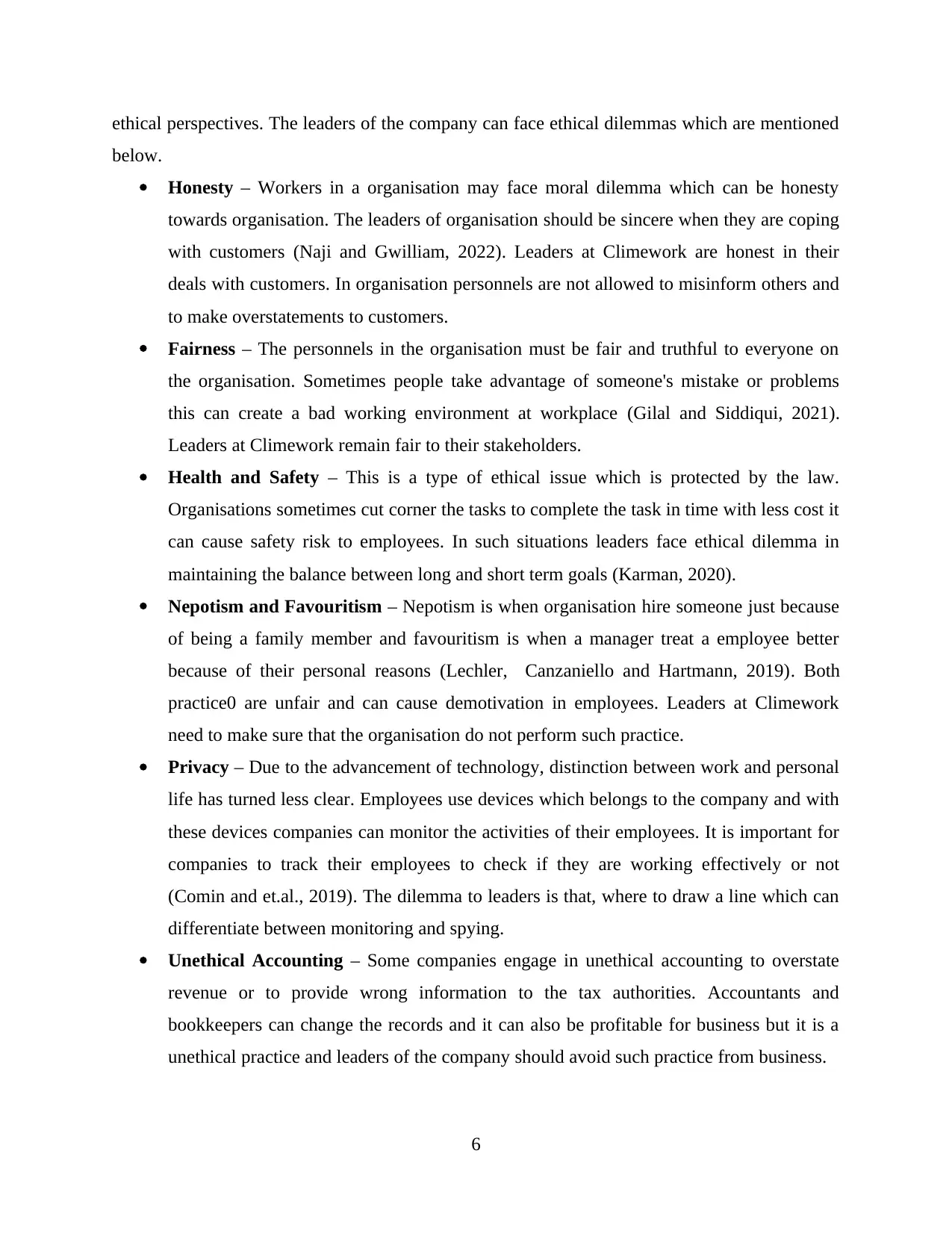
ethical perspectives. The leaders of the company can face ethical dilemmas which are mentioned
below.
Honesty – Workers in a organisation may face moral dilemma which can be honesty
towards organisation. The leaders of organisation should be sincere when they are coping
with customers (Naji and Gwilliam, 2022). Leaders at Climework are honest in their
deals with customers. In organisation personnels are not allowed to misinform others and
to make overstatements to customers.
Fairness – The personnels in the organisation must be fair and truthful to everyone on
the organisation. Sometimes people take advantage of someone's mistake or problems
this can create a bad working environment at workplace (Gilal and Siddiqui, 2021).
Leaders at Climework remain fair to their stakeholders.
Health and Safety – This is a type of ethical issue which is protected by the law.
Organisations sometimes cut corner the tasks to complete the task in time with less cost it
can cause safety risk to employees. In such situations leaders face ethical dilemma in
maintaining the balance between long and short term goals (Karman, 2020).
Nepotism and Favouritism – Nepotism is when organisation hire someone just because
of being a family member and favouritism is when a manager treat a employee better
because of their personal reasons (Lechler, Canzaniello and Hartmann, 2019). Both
practice0 are unfair and can cause demotivation in employees. Leaders at Climework
need to make sure that the organisation do not perform such practice.
Privacy – Due to the advancement of technology, distinction between work and personal
life has turned less clear. Employees use devices which belongs to the company and with
these devices companies can monitor the activities of their employees. It is important for
companies to track their employees to check if they are working effectively or not
(Comin and et.al., 2019). The dilemma to leaders is that, where to draw a line which can
differentiate between monitoring and spying.
Unethical Accounting – Some companies engage in unethical accounting to overstate
revenue or to provide wrong information to the tax authorities. Accountants and
bookkeepers can change the records and it can also be profitable for business but it is a
unethical practice and leaders of the company should avoid such practice from business.
6
below.
Honesty – Workers in a organisation may face moral dilemma which can be honesty
towards organisation. The leaders of organisation should be sincere when they are coping
with customers (Naji and Gwilliam, 2022). Leaders at Climework are honest in their
deals with customers. In organisation personnels are not allowed to misinform others and
to make overstatements to customers.
Fairness – The personnels in the organisation must be fair and truthful to everyone on
the organisation. Sometimes people take advantage of someone's mistake or problems
this can create a bad working environment at workplace (Gilal and Siddiqui, 2021).
Leaders at Climework remain fair to their stakeholders.
Health and Safety – This is a type of ethical issue which is protected by the law.
Organisations sometimes cut corner the tasks to complete the task in time with less cost it
can cause safety risk to employees. In such situations leaders face ethical dilemma in
maintaining the balance between long and short term goals (Karman, 2020).
Nepotism and Favouritism – Nepotism is when organisation hire someone just because
of being a family member and favouritism is when a manager treat a employee better
because of their personal reasons (Lechler, Canzaniello and Hartmann, 2019). Both
practice0 are unfair and can cause demotivation in employees. Leaders at Climework
need to make sure that the organisation do not perform such practice.
Privacy – Due to the advancement of technology, distinction between work and personal
life has turned less clear. Employees use devices which belongs to the company and with
these devices companies can monitor the activities of their employees. It is important for
companies to track their employees to check if they are working effectively or not
(Comin and et.al., 2019). The dilemma to leaders is that, where to draw a line which can
differentiate between monitoring and spying.
Unethical Accounting – Some companies engage in unethical accounting to overstate
revenue or to provide wrong information to the tax authorities. Accountants and
bookkeepers can change the records and it can also be profitable for business but it is a
unethical practice and leaders of the company should avoid such practice from business.
6
⊘ This is a preview!⊘
Do you want full access?
Subscribe today to unlock all pages.

Trusted by 1+ million students worldwide
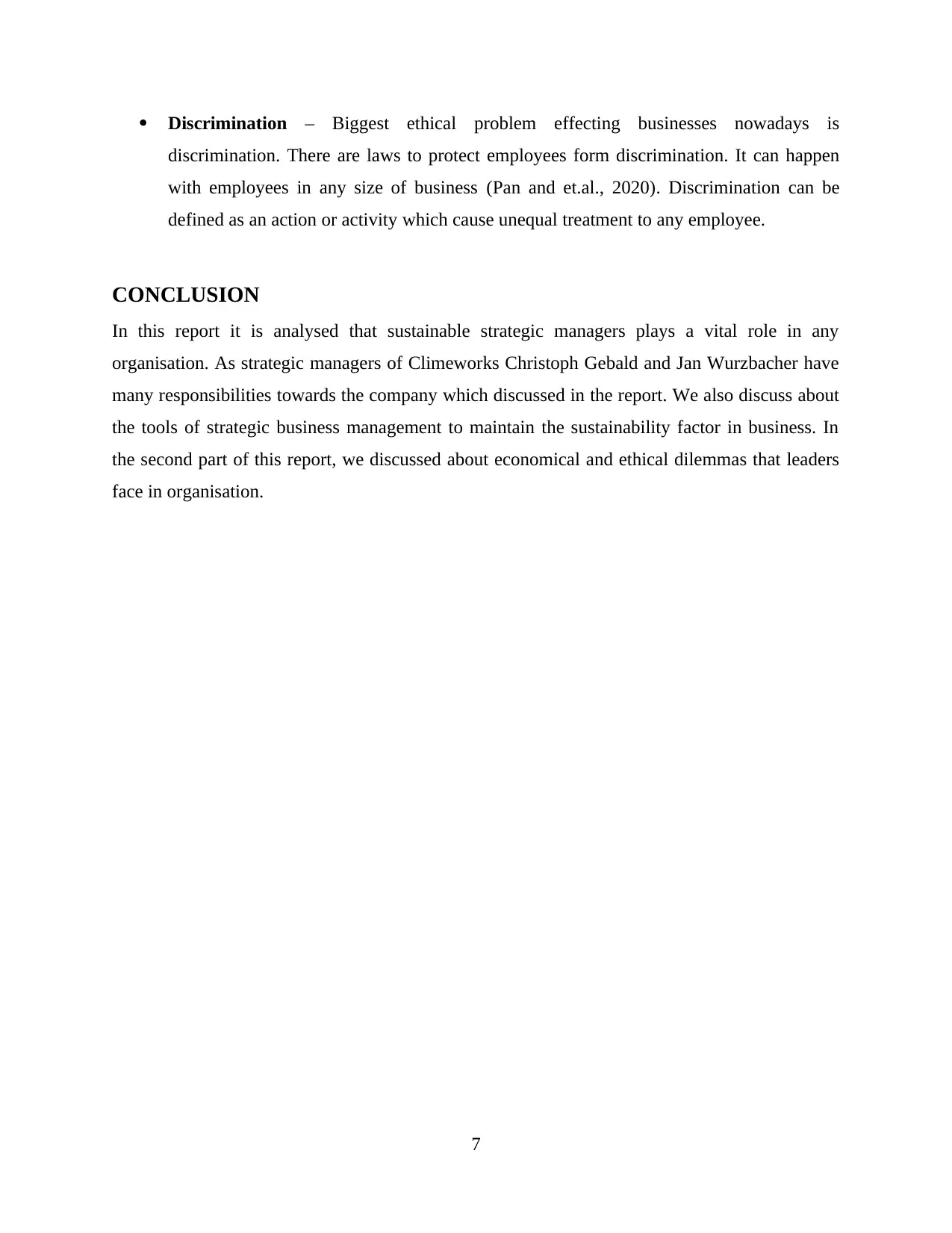
Discrimination – Biggest ethical problem effecting businesses nowadays is
discrimination. There are laws to protect employees form discrimination. It can happen
with employees in any size of business (Pan and et.al., 2020). Discrimination can be
defined as an action or activity which cause unequal treatment to any employee.
CONCLUSION
In this report it is analysed that sustainable strategic managers plays a vital role in any
organisation. As strategic managers of Climeworks Christoph Gebald and Jan Wurzbacher have
many responsibilities towards the company which discussed in the report. We also discuss about
the tools of strategic business management to maintain the sustainability factor in business. In
the second part of this report, we discussed about economical and ethical dilemmas that leaders
face in organisation.
7
discrimination. There are laws to protect employees form discrimination. It can happen
with employees in any size of business (Pan and et.al., 2020). Discrimination can be
defined as an action or activity which cause unequal treatment to any employee.
CONCLUSION
In this report it is analysed that sustainable strategic managers plays a vital role in any
organisation. As strategic managers of Climeworks Christoph Gebald and Jan Wurzbacher have
many responsibilities towards the company which discussed in the report. We also discuss about
the tools of strategic business management to maintain the sustainability factor in business. In
the second part of this report, we discussed about economical and ethical dilemmas that leaders
face in organisation.
7
Paraphrase This Document
Need a fresh take? Get an instant paraphrase of this document with our AI Paraphraser
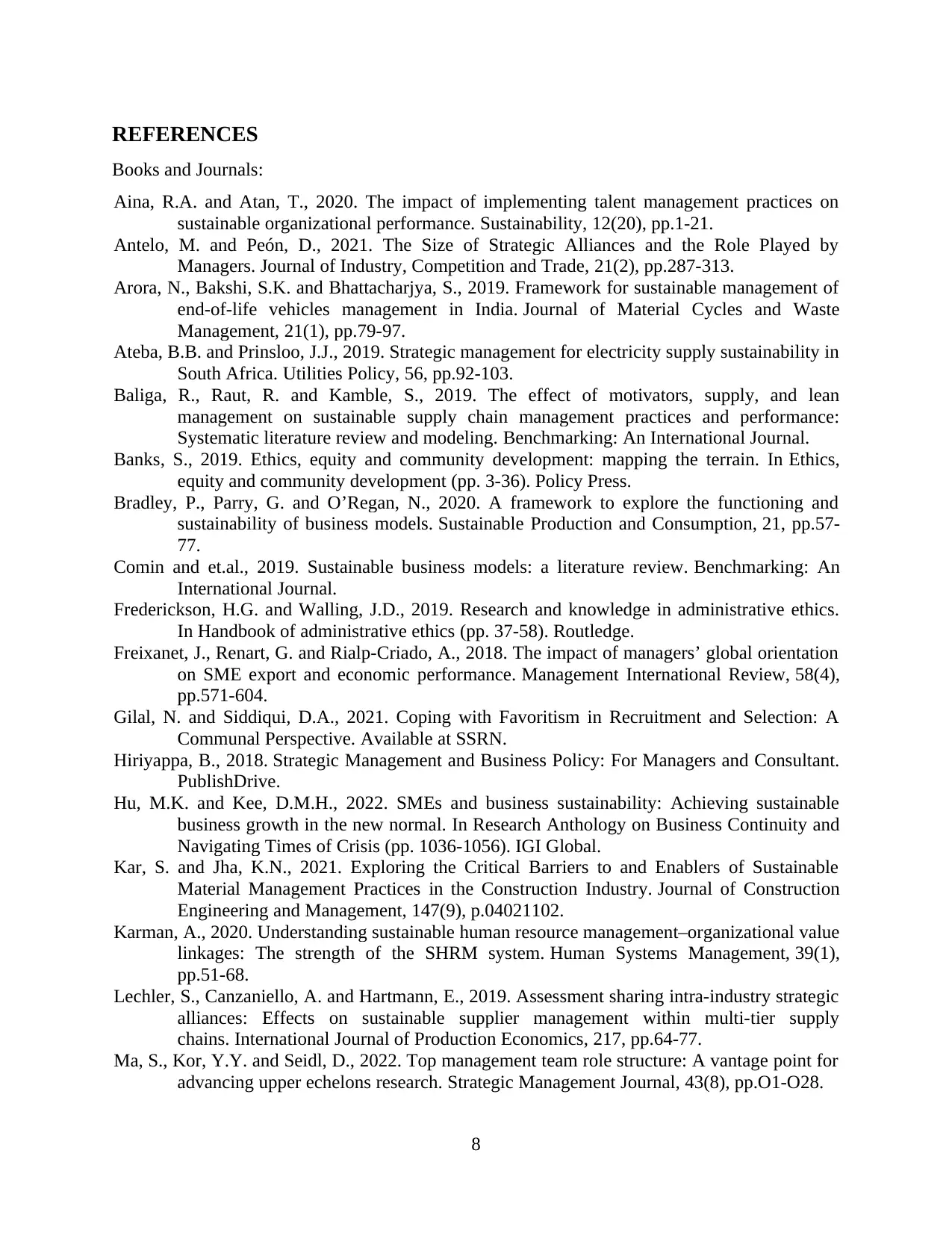
REFERENCES
Books and Journals:
Aina, R.A. and Atan, T., 2020. The impact of implementing talent management practices on
sustainable organizational performance. Sustainability, 12(20), pp.1-21.
Antelo, M. and Peón, D., 2021. The Size of Strategic Alliances and the Role Played by
Managers. Journal of Industry, Competition and Trade, 21(2), pp.287-313.
Arora, N., Bakshi, S.K. and Bhattacharjya, S., 2019. Framework for sustainable management of
end-of-life vehicles management in India. Journal of Material Cycles and Waste
Management, 21(1), pp.79-97.
Ateba, B.B. and Prinsloo, J.J., 2019. Strategic management for electricity supply sustainability in
South Africa. Utilities Policy, 56, pp.92-103.
Baliga, R., Raut, R. and Kamble, S., 2019. The effect of motivators, supply, and lean
management on sustainable supply chain management practices and performance:
Systematic literature review and modeling. Benchmarking: An International Journal.
Banks, S., 2019. Ethics, equity and community development: mapping the terrain. In Ethics,
equity and community development (pp. 3-36). Policy Press.
Bradley, P., Parry, G. and O’Regan, N., 2020. A framework to explore the functioning and
sustainability of business models. Sustainable Production and Consumption, 21, pp.57-
77.
Comin and et.al., 2019. Sustainable business models: a literature review. Benchmarking: An
International Journal.
Frederickson, H.G. and Walling, J.D., 2019. Research and knowledge in administrative ethics.
In Handbook of administrative ethics (pp. 37-58). Routledge.
Freixanet, J., Renart, G. and Rialp-Criado, A., 2018. The impact of managers’ global orientation
on SME export and economic performance. Management International Review, 58(4),
pp.571-604.
Gilal, N. and Siddiqui, D.A., 2021. Coping with Favoritism in Recruitment and Selection: A
Communal Perspective. Available at SSRN.
Hiriyappa, B., 2018. Strategic Management and Business Policy: For Managers and Consultant.
PublishDrive.
Hu, M.K. and Kee, D.M.H., 2022. SMEs and business sustainability: Achieving sustainable
business growth in the new normal. In Research Anthology on Business Continuity and
Navigating Times of Crisis (pp. 1036-1056). IGI Global.
Kar, S. and Jha, K.N., 2021. Exploring the Critical Barriers to and Enablers of Sustainable
Material Management Practices in the Construction Industry. Journal of Construction
Engineering and Management, 147(9), p.04021102.
Karman, A., 2020. Understanding sustainable human resource management–organizational value
linkages: The strength of the SHRM system. Human Systems Management, 39(1),
pp.51-68.
Lechler, S., Canzaniello, A. and Hartmann, E., 2019. Assessment sharing intra-industry strategic
alliances: Effects on sustainable supplier management within multi-tier supply
chains. International Journal of Production Economics, 217, pp.64-77.
Ma, S., Kor, Y.Y. and Seidl, D., 2022. Top management team role structure: A vantage point for
advancing upper echelons research. Strategic Management Journal, 43(8), pp.O1-O28.
8
Books and Journals:
Aina, R.A. and Atan, T., 2020. The impact of implementing talent management practices on
sustainable organizational performance. Sustainability, 12(20), pp.1-21.
Antelo, M. and Peón, D., 2021. The Size of Strategic Alliances and the Role Played by
Managers. Journal of Industry, Competition and Trade, 21(2), pp.287-313.
Arora, N., Bakshi, S.K. and Bhattacharjya, S., 2019. Framework for sustainable management of
end-of-life vehicles management in India. Journal of Material Cycles and Waste
Management, 21(1), pp.79-97.
Ateba, B.B. and Prinsloo, J.J., 2019. Strategic management for electricity supply sustainability in
South Africa. Utilities Policy, 56, pp.92-103.
Baliga, R., Raut, R. and Kamble, S., 2019. The effect of motivators, supply, and lean
management on sustainable supply chain management practices and performance:
Systematic literature review and modeling. Benchmarking: An International Journal.
Banks, S., 2019. Ethics, equity and community development: mapping the terrain. In Ethics,
equity and community development (pp. 3-36). Policy Press.
Bradley, P., Parry, G. and O’Regan, N., 2020. A framework to explore the functioning and
sustainability of business models. Sustainable Production and Consumption, 21, pp.57-
77.
Comin and et.al., 2019. Sustainable business models: a literature review. Benchmarking: An
International Journal.
Frederickson, H.G. and Walling, J.D., 2019. Research and knowledge in administrative ethics.
In Handbook of administrative ethics (pp. 37-58). Routledge.
Freixanet, J., Renart, G. and Rialp-Criado, A., 2018. The impact of managers’ global orientation
on SME export and economic performance. Management International Review, 58(4),
pp.571-604.
Gilal, N. and Siddiqui, D.A., 2021. Coping with Favoritism in Recruitment and Selection: A
Communal Perspective. Available at SSRN.
Hiriyappa, B., 2018. Strategic Management and Business Policy: For Managers and Consultant.
PublishDrive.
Hu, M.K. and Kee, D.M.H., 2022. SMEs and business sustainability: Achieving sustainable
business growth in the new normal. In Research Anthology on Business Continuity and
Navigating Times of Crisis (pp. 1036-1056). IGI Global.
Kar, S. and Jha, K.N., 2021. Exploring the Critical Barriers to and Enablers of Sustainable
Material Management Practices in the Construction Industry. Journal of Construction
Engineering and Management, 147(9), p.04021102.
Karman, A., 2020. Understanding sustainable human resource management–organizational value
linkages: The strength of the SHRM system. Human Systems Management, 39(1),
pp.51-68.
Lechler, S., Canzaniello, A. and Hartmann, E., 2019. Assessment sharing intra-industry strategic
alliances: Effects on sustainable supplier management within multi-tier supply
chains. International Journal of Production Economics, 217, pp.64-77.
Ma, S., Kor, Y.Y. and Seidl, D., 2022. Top management team role structure: A vantage point for
advancing upper echelons research. Strategic Management Journal, 43(8), pp.O1-O28.
8
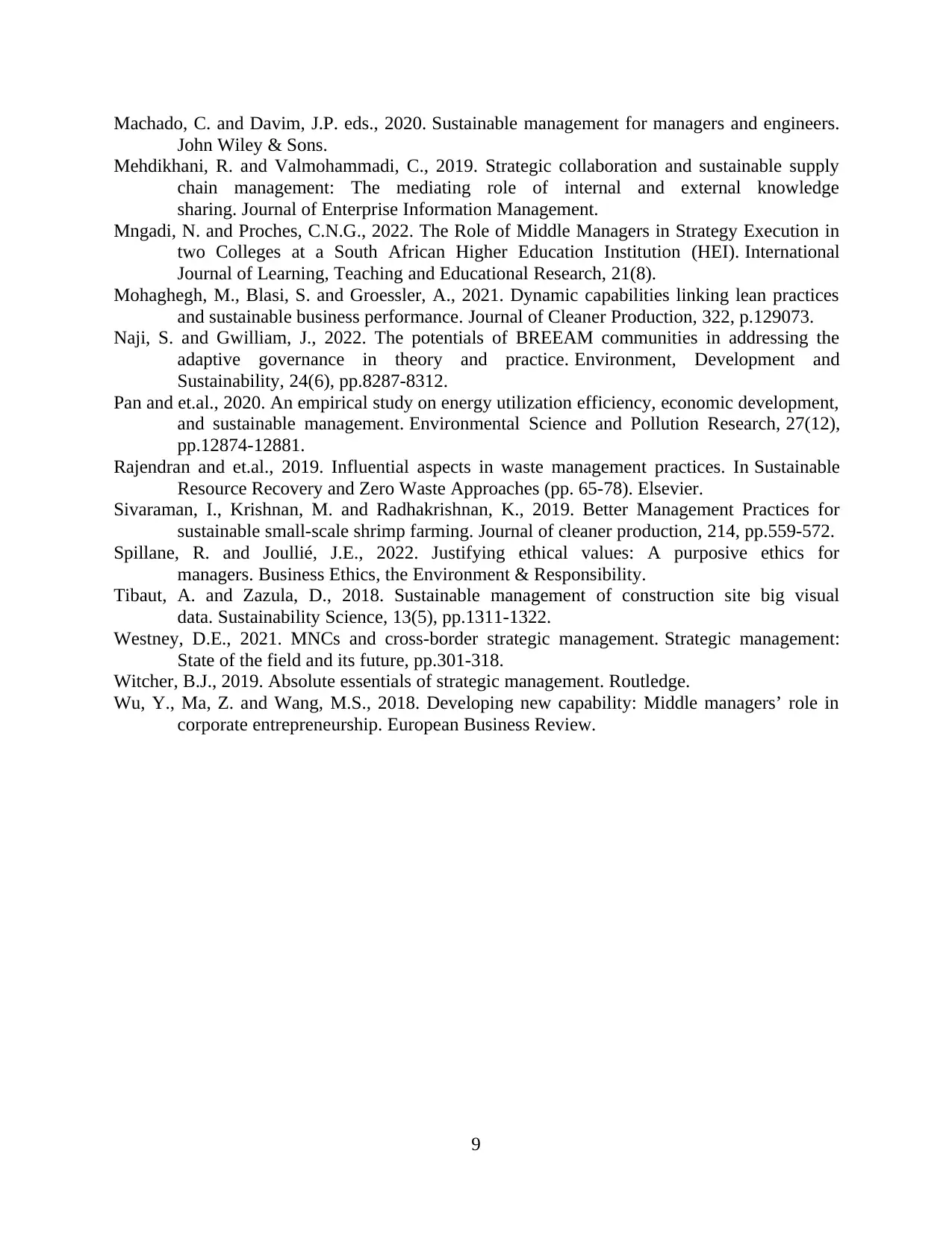
Machado, C. and Davim, J.P. eds., 2020. Sustainable management for managers and engineers.
John Wiley & Sons.
Mehdikhani, R. and Valmohammadi, C., 2019. Strategic collaboration and sustainable supply
chain management: The mediating role of internal and external knowledge
sharing. Journal of Enterprise Information Management.
Mngadi, N. and Proches, C.N.G., 2022. The Role of Middle Managers in Strategy Execution in
two Colleges at a South African Higher Education Institution (HEI). International
Journal of Learning, Teaching and Educational Research, 21(8).
Mohaghegh, M., Blasi, S. and Groessler, A., 2021. Dynamic capabilities linking lean practices
and sustainable business performance. Journal of Cleaner Production, 322, p.129073.
Naji, S. and Gwilliam, J., 2022. The potentials of BREEAM communities in addressing the
adaptive governance in theory and practice. Environment, Development and
Sustainability, 24(6), pp.8287-8312.
Pan and et.al., 2020. An empirical study on energy utilization efficiency, economic development,
and sustainable management. Environmental Science and Pollution Research, 27(12),
pp.12874-12881.
Rajendran and et.al., 2019. Influential aspects in waste management practices. In Sustainable
Resource Recovery and Zero Waste Approaches (pp. 65-78). Elsevier.
Sivaraman, I., Krishnan, M. and Radhakrishnan, K., 2019. Better Management Practices for
sustainable small-scale shrimp farming. Journal of cleaner production, 214, pp.559-572.
Spillane, R. and Joullié, J.E., 2022. Justifying ethical values: A purposive ethics for
managers. Business Ethics, the Environment & Responsibility.
Tibaut, A. and Zazula, D., 2018. Sustainable management of construction site big visual
data. Sustainability Science, 13(5), pp.1311-1322.
Westney, D.E., 2021. MNCs and cross‐border strategic management. Strategic management:
State of the field and its future, pp.301-318.
Witcher, B.J., 2019. Absolute essentials of strategic management. Routledge.
Wu, Y., Ma, Z. and Wang, M.S., 2018. Developing new capability: Middle managers’ role in
corporate entrepreneurship. European Business Review.
9
John Wiley & Sons.
Mehdikhani, R. and Valmohammadi, C., 2019. Strategic collaboration and sustainable supply
chain management: The mediating role of internal and external knowledge
sharing. Journal of Enterprise Information Management.
Mngadi, N. and Proches, C.N.G., 2022. The Role of Middle Managers in Strategy Execution in
two Colleges at a South African Higher Education Institution (HEI). International
Journal of Learning, Teaching and Educational Research, 21(8).
Mohaghegh, M., Blasi, S. and Groessler, A., 2021. Dynamic capabilities linking lean practices
and sustainable business performance. Journal of Cleaner Production, 322, p.129073.
Naji, S. and Gwilliam, J., 2022. The potentials of BREEAM communities in addressing the
adaptive governance in theory and practice. Environment, Development and
Sustainability, 24(6), pp.8287-8312.
Pan and et.al., 2020. An empirical study on energy utilization efficiency, economic development,
and sustainable management. Environmental Science and Pollution Research, 27(12),
pp.12874-12881.
Rajendran and et.al., 2019. Influential aspects in waste management practices. In Sustainable
Resource Recovery and Zero Waste Approaches (pp. 65-78). Elsevier.
Sivaraman, I., Krishnan, M. and Radhakrishnan, K., 2019. Better Management Practices for
sustainable small-scale shrimp farming. Journal of cleaner production, 214, pp.559-572.
Spillane, R. and Joullié, J.E., 2022. Justifying ethical values: A purposive ethics for
managers. Business Ethics, the Environment & Responsibility.
Tibaut, A. and Zazula, D., 2018. Sustainable management of construction site big visual
data. Sustainability Science, 13(5), pp.1311-1322.
Westney, D.E., 2021. MNCs and cross‐border strategic management. Strategic management:
State of the field and its future, pp.301-318.
Witcher, B.J., 2019. Absolute essentials of strategic management. Routledge.
Wu, Y., Ma, Z. and Wang, M.S., 2018. Developing new capability: Middle managers’ role in
corporate entrepreneurship. European Business Review.
9
⊘ This is a preview!⊘
Do you want full access?
Subscribe today to unlock all pages.

Trusted by 1+ million students worldwide
1 out of 12
Related Documents
Your All-in-One AI-Powered Toolkit for Academic Success.
+13062052269
info@desklib.com
Available 24*7 on WhatsApp / Email
![[object Object]](/_next/static/media/star-bottom.7253800d.svg)
Unlock your academic potential
Copyright © 2020–2026 A2Z Services. All Rights Reserved. Developed and managed by ZUCOL.



